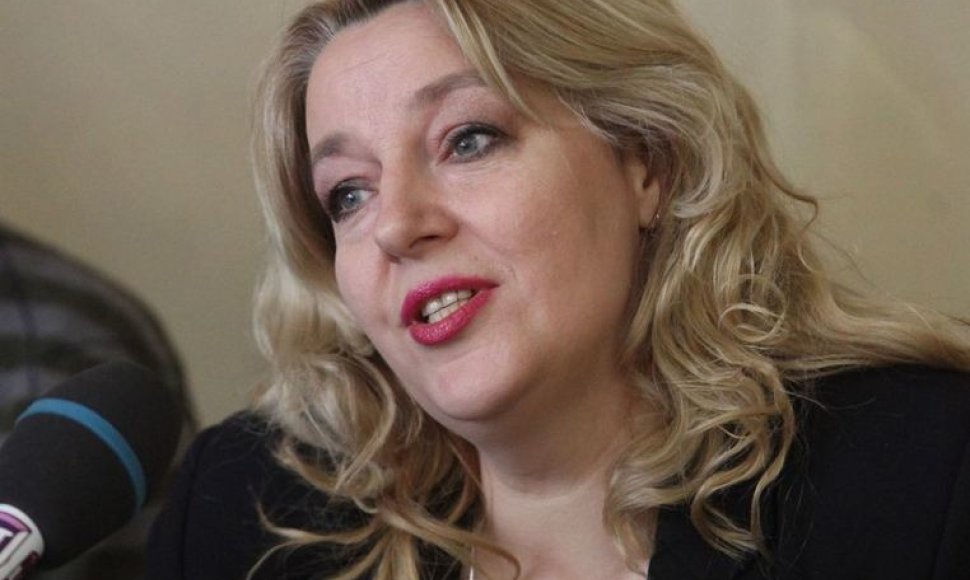“One thing I've learnt over the last 20 years is that I am not satisfied with being just a performer, I want to share my interpretation of certain pieces – I've so much on my mind,” says the founder of Vilnius Chamber Opera.
This Thursday, at the Russian Drama Theatre of Vilnius, Linaburgytė is presenting Giacomo Puccini's Tosca. Not only is she the director of this opera production, but also the star – she plays the role of Floria Tosca.
– Your production of Tosca is almost complete. Can you compare what it means to be a lead singer and a director?
– When you only perform, you concentrate on one character. As a director, by consistently examining all characters, I can see different possible renditions. I am not someone who wants to invent a bicycle or knock everyone off their feet. I stick to the composer's conception and his dramaturgy.
Many singers say they find it easy to play Tosca. Both the jealousy of suspecting your lover was with someone else and the temperament must be familiar to many women.
Right now, however, I am more interested in understanding feelings I haven't experienced in real life. For example, that horrible and devastating deed, when Tosca kills Scarpia.
It is difficult to step into the director's shoes and get the result you desire. At times, I find it hard to sell my idea and convince others – singers have egos and their own ideas about the parts they play.
– There have been other productions of Tosca in Lithuania, but not that many. And it is a grand piece of opera – did you not feel intimidated?
– When I was picking a piece to produce, I had several options in mind. In the end, I chose Tosca because it has a brilliant score that leaves no spectator indifferent. Puccini is a composer of the highest emotional range. Besides, I welcomed the opportunity to more thoroughly analyse the character of Tosca. As I was sitting through various productions of this opera, I started raising questions: why is it the way it is and not otherwise? I wanted to come up with my own solution.
– Tosca is a whimsical singer who makes a scene for her lover because he paints a fair-haired woman. Do you find this heroine close?
– At the moment, I wish she were less capricious. I see her as a gentle and fragile soul. It is natural that a woman should get angry when she feels her love is threatened. But Tosca is not like that, her emotions quickly subside – she is furious one moment and laughs the next. She is not one-sided. I wish very much for my Tosca to be gentle, even though the music does oblige, it gives a framework. I try to steer away from the capricious primadonna cliché.
– How will your Tosca be different from others we've seen on the Lithuanian stage?
– I will not try to shock. Even though we inhabit times that value innovation, I want to unearth something forgotten, an eternal classic, if you will. I want to touch it again, so people can listen and hear it.
I love opera in its classical form so much that I do not wish to look for innovative expressions therein. It is so deep and rich in itself, one only needs to awaken it, to revive the characters.
No other art form is as much a synthesis of other arts as opera – it encompasses fine art, architecture, music, acting, orchestration. No other genre is as potent. I believe, therefore, that opera will thrive as long as mankind survives.
– You have performed in many countries. How audiences there differ from one another?
– Lithuanians adore opera – I see many music lovers who look forward to new productions and sit through even the longest of pieces. Compared to other countries, they are more reserved. In Russia, for example, even old people tell you their comments or praises, Italians, too, are eager to share their observations and excellent knowledge of music. Here, opera is not as ubiquitous a genre.
– It is commonly believed that in order to succeed in the art world one must have powerful sponsors.
– It is but a stereotype. Every success is a result of strenuous effort. A person must create something to be acknowledged. For me, it is a matter of need – I cannot help creating. Many say I could just live peacefully, but if I was forbidden to sing, it would be the greatest misfortune.
– Drama is your cup of tea. Do you like reading?
– I've always been an ardent reader. This is probably where my desire to direct comes from – as you read, you want to resolve the drama in one way or another.
For a long time, my “reading list” included Constantin Stanislavski, Boris Pakrovski, and Walter Felsenstein. In fact, I am not very fond of fiction – I feel that novels are too contrived. I prefer psychological or philosophical books. Also Thomas Mann. There was a period when I'd eat up everything by Paulo Coleho, Jurga Ivanauskaitė. In poetry, Justinas Marcinkevičius has been a favourite of mine since childhood. It was from a line in his poem that I drew inspiration for my company's first performance.
I value communication of souls. So in opera, I strive for intimacy. And in grand productions, I wish to see the purpose of the man's being here on Earth.












